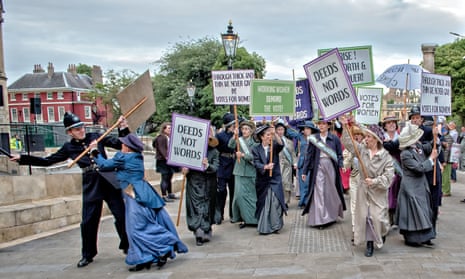For anyone who attended one of the hundreds of women’s marches in January, the crowd gathering each evening outside York Minster is a familiar one. Placards sway above people’s heads. Chants rise and fall. Voices call out: “Women united will never be defeated.”
The York Theatre Royal’s new community production looks to the past but starts and ends in the present. Sparked by a suggestion from actor Barbara Marten, Everything Is Possible tells the history of the suffragettes, framed within the continuing struggle for women’s rights. Beginning on the streets before moving inside the theatre, it is pointedly engaged with the democratic right to speak up.
In keeping with the Theatre Royal’s growing strand of community shows, the narrative is focused on York and its contribution to the fight for women’s votes. Marten plays Annie Seymour-Pearson, the city’s only suffragette to be imprisoned for militant protests, while the history of the women’s suffrage movement is grounded in the York branch of the Women’s Social and Political Union. Now, perhaps more than ever, it’s a local story worth telling.

As theatre, though, it’s hobbled by the competing demands of the form. There’s an awkward tension in Bridget Foreman’s script between the supposedly central story of Annie’s political awakening and the many subplots needed to create roles for the 100-strong community cast. Stories appear and then dissolve. Remembering all the characters, never mind caring about them, can be a challenge.
It also raises an uncomfortable question about the hierarchy of professional and amateur. Marten has little more stage time than several of the key supporting actors, all of whom are contributing their time and considerable talents unpaid.
That said, the community cast allows for thrilling theatrical scale. The crowd scenes, woven together by movement director Jon Beney, swell and sway with the force of a movement approaching its moment. Defiant fists punch the air, backed by stirring choral music. The ambition of the whole is impressive, even if its individual parts occasionally falter.
The show’s motto, borrowed from Emmeline Pankhurst, is: “Deeds not words.” Early on, in the outdoor prologue, a voice of dissent questions the impact of marches and demonstrations. More of that tension – between protest and outcome, means and ends – could be carried through the show. One thing it leaves in no doubt, though, is that for anything (let alone everything) to be possible, people must act.

Comments (…)
Sign in or create your Guardian account to join the discussion